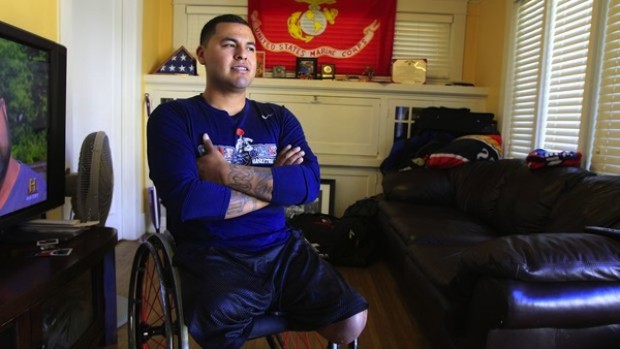
Freedom Station, grassroots San Diego nonprofit, looking to expand success
Jorge Salazar isn’t exactly sure where he would have gone.
It was January 2014. He was finally being discharged from the Marine Corps after a 2012 bomb blast in Afghanistan took both of his legs.
He had been living at the Navy hospital in Balboa Park. But those beds are for people still in uniform.
Salazar put up a calm exterior, but, “I was freaking out,” the former infantryman says.
That’s exactly why Freedom Station, a grassroots transitional housing complex in San Diego’s Golden Hill, was created in 2011.
The now nearly 4-year-old program has housed 30 injured post-Sept. 11 veterans as they make the transition from sergeant to civilian. And organizers are eyeing a second property to expand their services.
Back in 2004, Sandy Lehmkuhler saw the need while volunteering at the Navy hospital. That’s where the Pentagon sends some of the most gravely injured troops from the Afghanistan and Iraq wars, including many amputees.
These folks, mostly Marines, were waiting months for their medical discharges to be finalized. Sitting in hospital rooms wasn’t helping their morale, or their ability to imagine a life ahead.
Lehmkuhler had started a nonprofit group, Warrior Foundation, to provide extra comforts for long-term patients.
Taking a big leap, she and her board members bought a vintage Golden Hill complex. Each cottage around a central courtyard became home to an injured veteran.
They can stay for a few months or several years, if needed. Vets pay their own electric and cable bills, to give them a taste of what civilian life requires.
But the rent charged is below market rates in acknowledgment that disability benefits from the U.S. Department of Veterans Affairs can take months to begin.
Lehmkuhler has a framed photo of each veteran who’s called Freedom Station home. They sit on the fireplace mantle in one of the cottages.
Some are success stories. One former resident was just accepted into a master’s degree program in neuroscience.
Another works in medical sales. Two others bought or were given homes adapted for their needs.
In the beginning, Lehmkuhler thought each resident would stay about a year and a half before deciding where to settle.
But she has learned that the timing is different for each one. Some of the early residents are still living there.
“You know they are ready to go when they have purpose again,” said Lehmkuhler, the wife of a retired Navy chief warrant officer.
“I don’t care if they are going to buy a house and work on the house for the next year. Or they are going to train and become the world’s No. 1 weightlifter with no legs,” she said. “Once they find their niche, they are good to go.”
Lehmkuhler and her board now see a new problem to address.
She calls them “legacy warriors.”
Sometimes former Navy hospital patients return to San Diego for follow-on procedures. For example, if an amputee gains or loses weight, a new prosthetic is needed. Bone spurs can require repair.
Those veterans, and their spouses and children, may have no place to stay during the recovery period.
That’s what a second Freedom Station could help.
Lehmkuhler has her sights on a nearby property. Some of the new units would be set aside for veterans visiting the hospital.
“I still feel like there’s so much that we can’t count on the government to do for these guys,” Lehmkuhler said.
“I find it rewarding that as San Diegans we still can feel out what the need is and make it happen for them.”
Salazar, a divorced 25-year-old father of two, expertly chases after his young boys in a fancy wheelchair.
His Freedom Station cottage has a ramp for him. But the tiny place is pretty crowded when his children visit.
Formerly 6’3”, Salazar was a high school basketball center. Even though the bomb nearly cut him in half, he still has magic on the court.
He’s gotten so good with the chair that he is a sought-after adaptive basketball player. He has represented the Marine Corps at the annual Warrior Games and was invited to try out for the U.S. Paralympics team.
College is next for him, hopefully with a wheelchair basketball scholarship.
“I’m ready for it. I’m ready to move out,” Salazar said. “I don’t feel overwhelmed.” Anymore.




